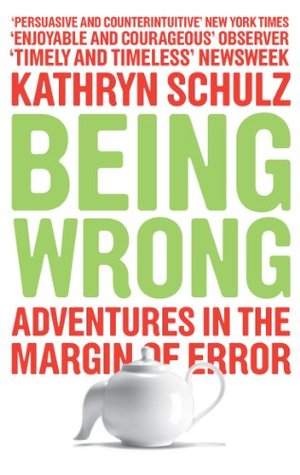More on this book
Community
Kindle Notes & Highlights
As absurd as it sounds when we stop to think about it, our steady state seems to be one of unconsciously assuming that we are very close to omniscient.
Of all the things we are wrong about, this idea of error might well top the list. It is our meta-mistake: we are wrong about what it means to be wrong.
that however disorienting, difficult, or humbling our mistakes might be, it is ultimately wrongness, not rightness, that can teach us who we are.
As a culture, we haven’t even mastered the basic skill of saying “I was wrong.” This is a startling deficiency,
It is possible to refrain from this sort of gloating (and consistently choosing to do so might be the final milestone of maturity),
Indeed, an old adage of therapists is that you can either be right or be in a relationship: you can remain attached to Team You winning every confrontation, or you can remain attached to your friends and family, but good luck trying to do both.
Our tricky senses, our limited intellects, our fickle memories, the veil of emotions, the tug of allegiances, the complexity of the world around us: all of this conspires to ensure that we get things wrong again and again.
it does feel like something to be wrong. It feels like being right.
we can be wrong, or we can know it, but we can’t do both at the same time.
The miracle of the human mind, after all, is that it can show us the world not only as it is, but also as it is not:
This book opened with the pleasure of being right, but it will conclude with the more complicated, more interesting, and ultimately more revelatory pleasure of being wrong.
Our errors are surely not such awfully solemn things. In a world where we are so certain to incur them in spite of all our caution, a certain lightness of heart seems healthier than this excessive nervousness on their behalf.
Practicality aside, such an objective presents three problems. The first is that, to believe we can eradicate error, we must also believe that we can consistently distinguish between it and the truth—a faith squarely at odds with remembering that we ourselves could be wrong.
Thus the catch–22 of wrongology: in order to get rid of error, we would already need to be infallible.
The final problem with seeking to eradicate error is that many such efforts are not well intentioned—or
In fact, not only can any given theory be proven wrong; as we saw in the last chapter, sooner or later, it probably will be. And when it is, the occasion will mark the success of science, not its failure.
Hirstein says that once he began studying confabulation, he started seeing sub-clinical versions of it everywhere he looked, in the form of neurologically normal people “who seem unable to say the words, ‘I don’t know,’ and will quickly produce some sort of plausible-sounding response to whatever they are asked.”


